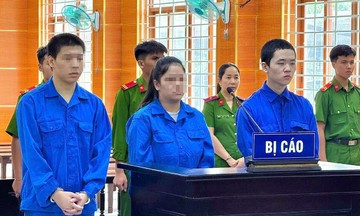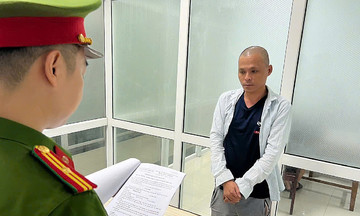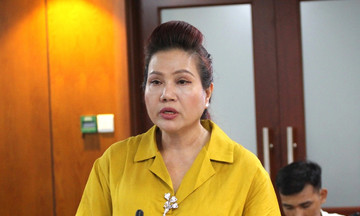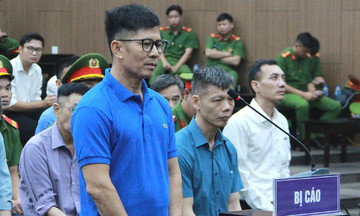The Ministry of Public Security’s investigation into the "Chi Em Rot" group, including Nguyen Thuc Thuy Tien (Miss Grand International 2021), Nguyen Thi Thai Hang (aka Hang Du Muc), and others for consumer fraud, has revealed numerous inadequacies in current regulations.
Celebrity endorsements have become distorted. Decree 181/2013/ND-CP, dated 14/11/2013, along with other guiding documents implementing the Law on Advertising, prohibits false and misleading advertising and stipulates penalties for violations. For food products, the law prohibits claims of medicinal benefits or using celebrities to endorse unverified effects. Advertisements must be clearly labeled as such, with transparent sponsorship disclosures.
However, online celebrity endorsements often take the form of personal testimonials, without advertisement labels or payment disclosures, misleading viewers into believing these are genuine recommendations. Furthermore, there is currently no mechanism to censor online advertising content. Any individual can promote food products on social media, making it difficult for authorities to detect, inspect, and monitor. Verifying seller identities and controlling advertising and transactions on social media and e-commerce platforms is challenging due to the internet's anonymity and cross-border nature.
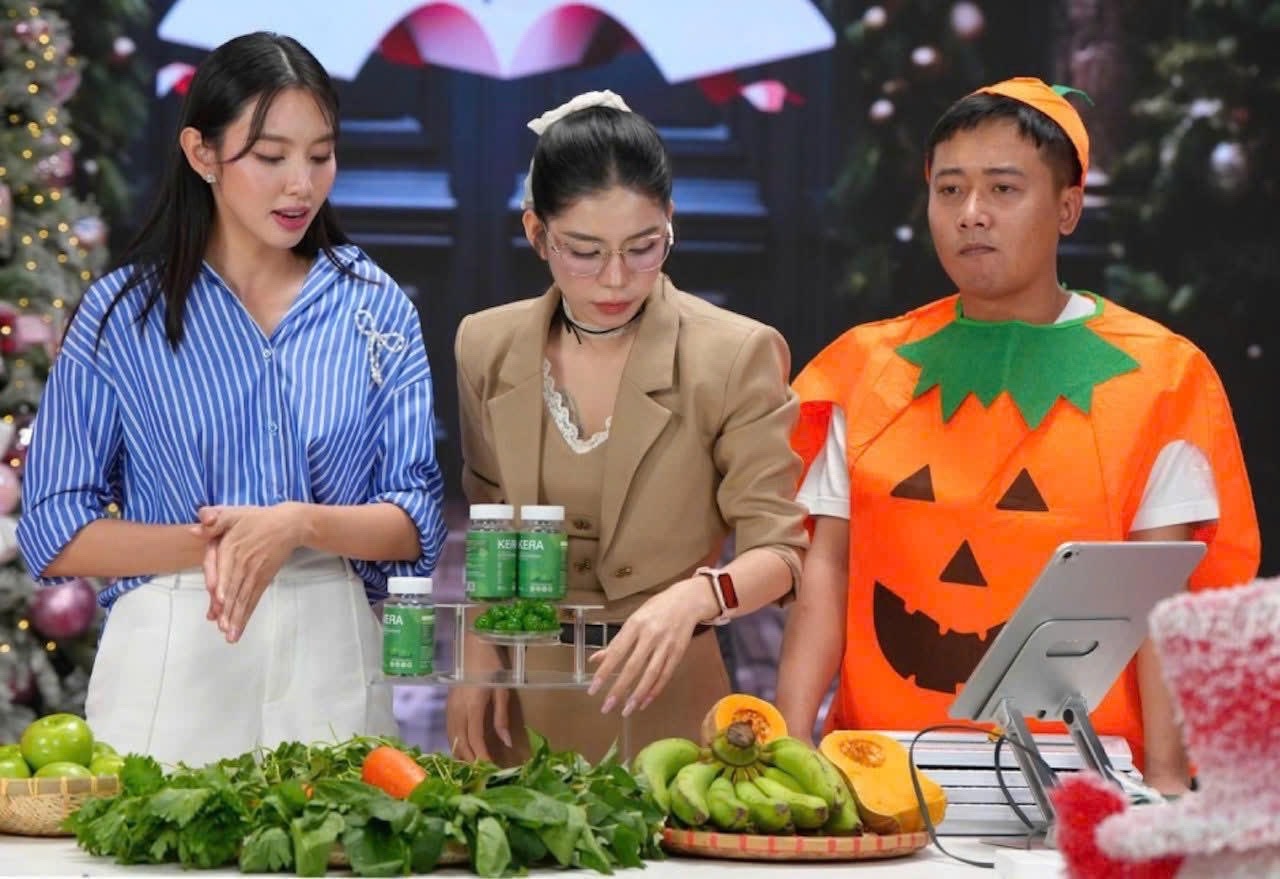 |
Miss Thuy Tien, Quang Linh Vlogs, and Hang Du Muc during a livestream. Photo: Video still |
Miss Thuy Tien, Quang Linh Vlogs, and Hang Du Muc during a livestream. Photo: Video still
This lack of oversight allowed Le Thanh Cong and three key opinion leaders (KOLs) – Hang Du Muc, Miss Thuy Tien, and Quang Linh Vlogs (a friend of Cong) – to promote the product with false claims. Quang Linh Vlogs stated, “One candy is equivalent to a plate of boiled vegetables," to attract consumers. Miss Thuy Tien advertised, “Kera is a candy that supplements fiber and nutrients for everyone, not just those who don't eat vegetables like me. Each candy contains 10 different fruits and vegetables along with vitamins.”
However, the investigation found the fiber content in the candy to be very low – only 0.935% – providing little fiber benefit. Despite this, the group exaggerated its effects.
The lack of specific regulations for e-commerce and livestreaming is another issue. Decree 52/2013/ND-CP on e-commerce, amended by Decree 85/2021/ND-CP, outlines the responsibilities of e-commerce platform owners and online sellers. However, verifying seller information and controlling the origin and quality of goods, especially food products, on these platforms remains limited. The Ministry of Public Security believes that handling violations on websites and social media accounts is slow and incomplete. There are no specific regulations to control food sales through online platforms, livestreams, or e-commerce platforms like TikTok, Shopee, and Lazada.
On 12/12/2024, Thuy Tien, Hang, and Linh livestreamed a pre-order sale of Kera candy, selling 3,109 boxes for over 4 billion VND. Chi Em Rot Company continued to hold other livestreams to sell Kera candy. From 12/12/2024 to 14/3/2025, the company sold 129,617 boxes, earning over 17.5 billion VND.
 |
Miss Thuy Tien at the time of her arrest. Photo: Linh Dan |
Miss Thuy Tien at the time of her arrest. Photo: Linh Dan
Current regulations allow businesses to self-certify their products under the 2010 Food Safety Law and Decree 15/2018/ND-CP. However, this lacks a screening and pre-inspection mechanism. Regulatory agencies accepting these certifications bear little responsibility, leaving it to the businesses. Inspections occur randomly after products are on the market. Consequently, many substandard products are sold. This loophole has been exploited to substitute key ingredients with cheaper, unverified, and potentially harmful ones for profit.
In this case, Nguyen Phong (Chairman of Asia Life JSC, contracted by Hang and Tien to produce Kera candy) and Nguyen Pham Hong Vy, knowing the actual formula contained only 0.747% fruits and vegetables, submitted falsified self-certifications, inflating the content to 28.13%. Thus, the substandard Kera candy was circulated in the market.
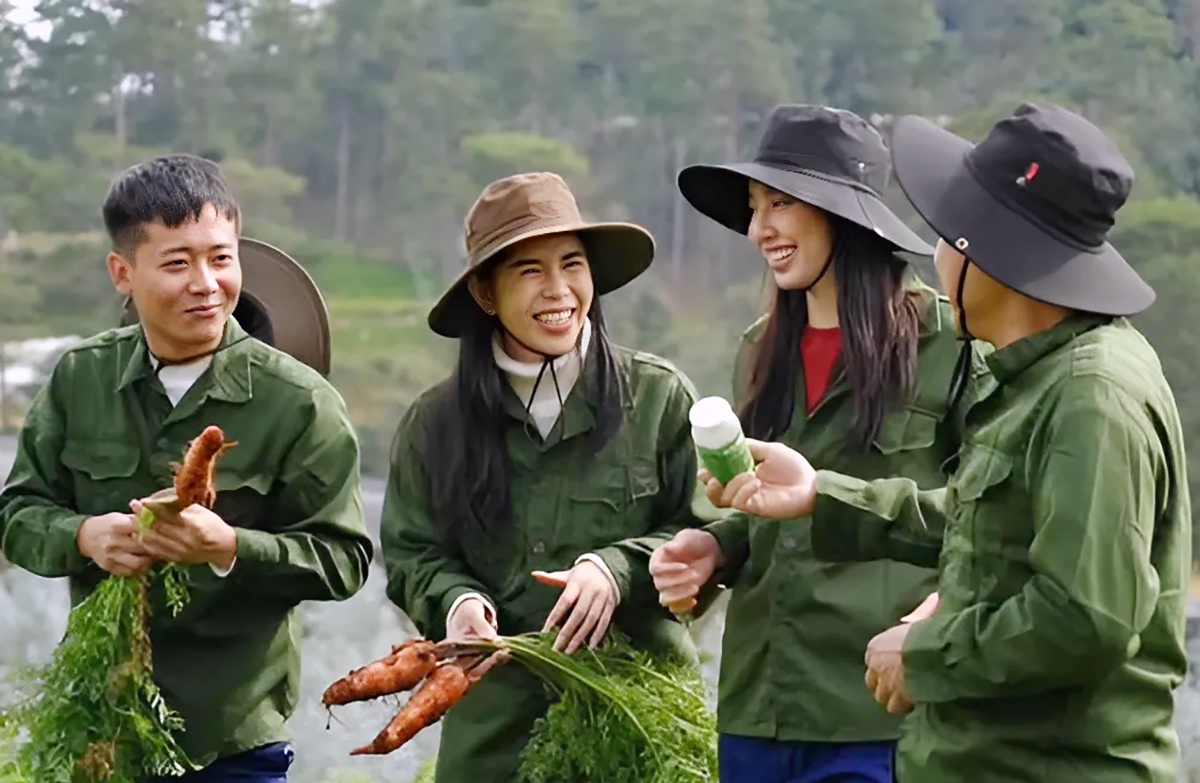 |
Miss Thuy Tien (second from right), Hang Du Muc (center), and Quang Linh Vlogs (left) during a promotional visit to the supposed source of Kera candy ingredients. Photo: Video still |
Miss Thuy Tien (second from right), Hang Du Muc (center), and Quang Linh Vlogs (left) during a promotional visit to the supposed source of Kera candy ingredients. Photo: Video still
The self-certification system lacks mandatory pre-market testing, removing a crucial quality control measure. Publicly available self-certification data is incomplete and fragmented, making oversight difficult. Many businesses conduct perfunctory tests or even purchase falsified test results. Authorities often discover violations only after public complaints, posing risks to consumer health. Post-market inspections are lax, with limited staff and infrequent checks, failing to cover smaller businesses and online operations. Management is fragmented across multiple agencies with poor coordination and a lack of shared databases for tracking violations.
Before criminal charges, Asia Life was fined over 224 million VND and suspended for two months – a lenient penalty compared to the tens of billions of VND in illicit profits. Current fines under Decree 38/2021/ND-CP for violations in culture and advertising are insufficient deterrents. Many violators treat fines as a "business expense" and continue their practices.
The Ministry of Public Security recommends amending regulations to increase fines, confiscate products, impose longer business bans, and pursue criminal charges when warranted. They urge regulatory bodies to revise policies, strengthen penalties for exploiting online advertising and using KOLs for deception, and improve regulations for ingredient quality, technical dossiers, and pre-market testing. To prevent misinformation, stricter controls on dietary supplement advertising on social media and collaboration with online platforms are needed.
Regarding the counterfeit food production by Nguyen Phong and others, the investigation uncovered further criminal activity in product distribution and promotion. Due to the case's complexity, some aspects have been separated into another investigation to ensure a thorough process.
Quoc Thang






